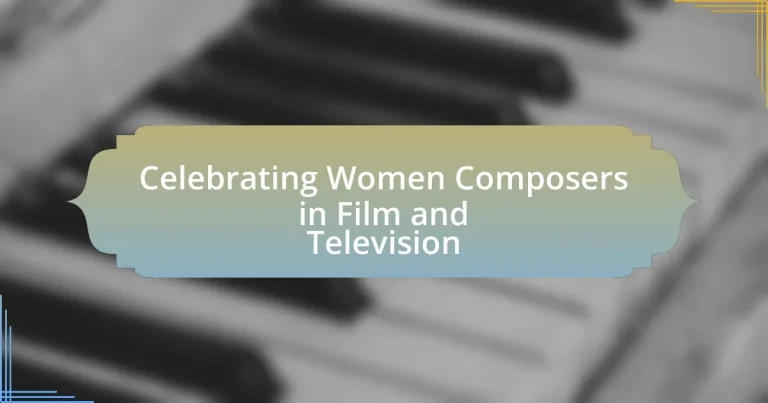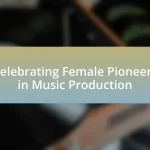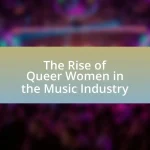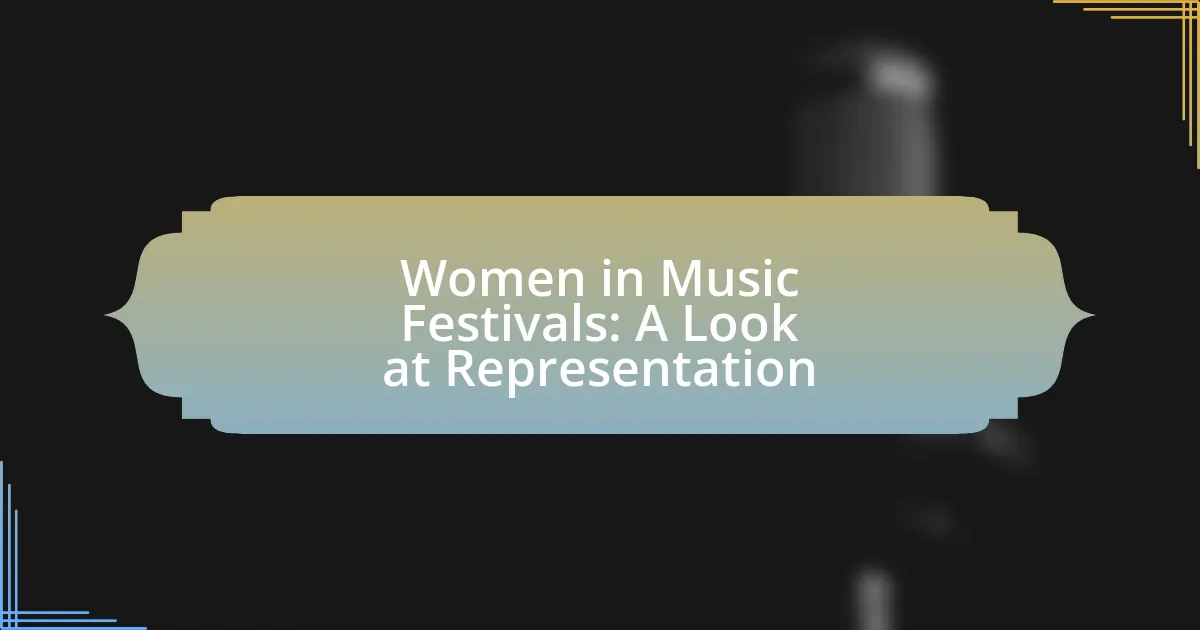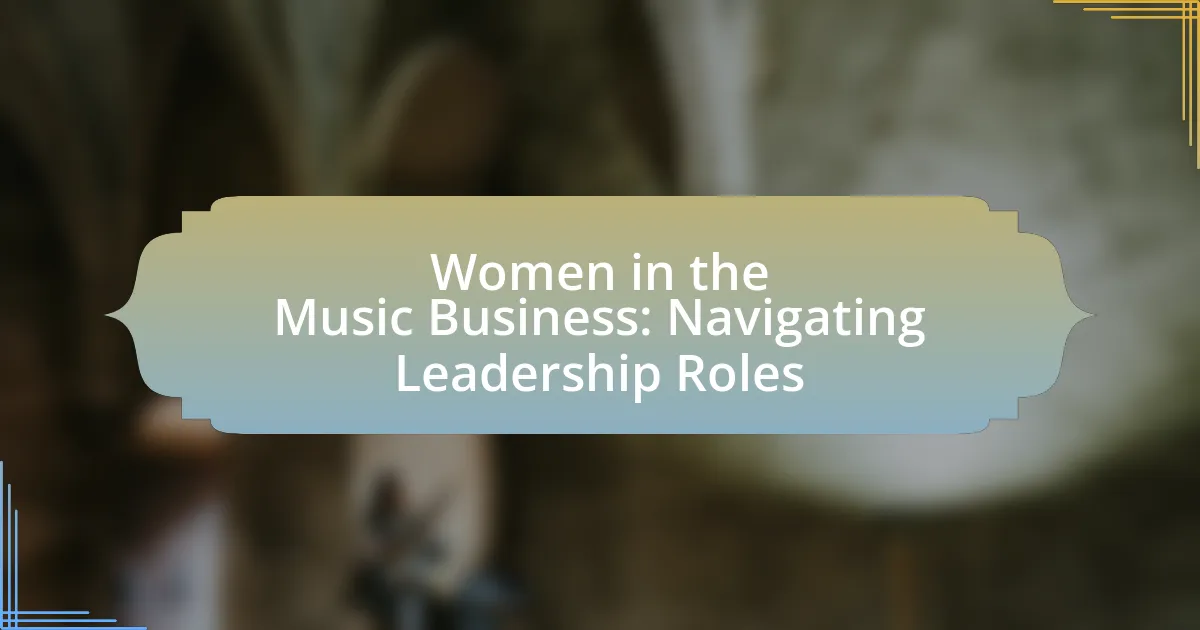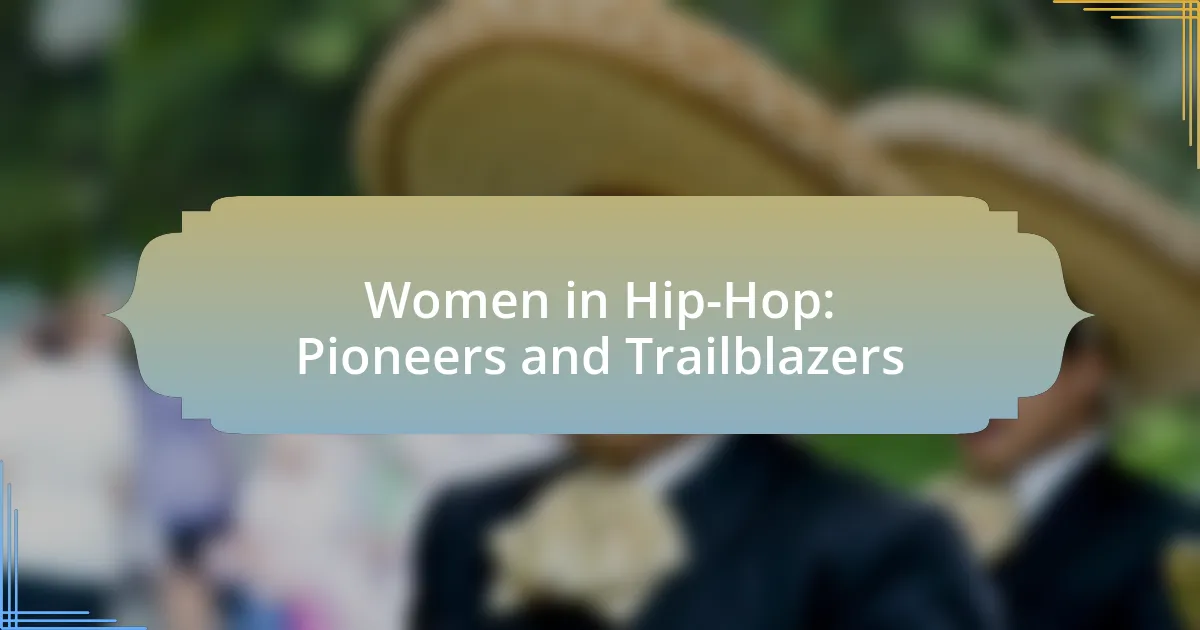The article focuses on the significance of celebrating women composers in film and television, emphasizing the importance of gender equality and representation in a male-dominated industry. It highlights the contributions of notable female composers, such as Hildur Guðnadóttir and Rachel Portman, and discusses their achievements, which have enriched storytelling and paved the way for future generations. The article also addresses the challenges women composers face, including gender bias and underrepresentation, while outlining initiatives and best practices to promote and support their work in the industry. Additionally, it explores the impact of diversity in music on storytelling and the role of audiences in advocating for women composers.
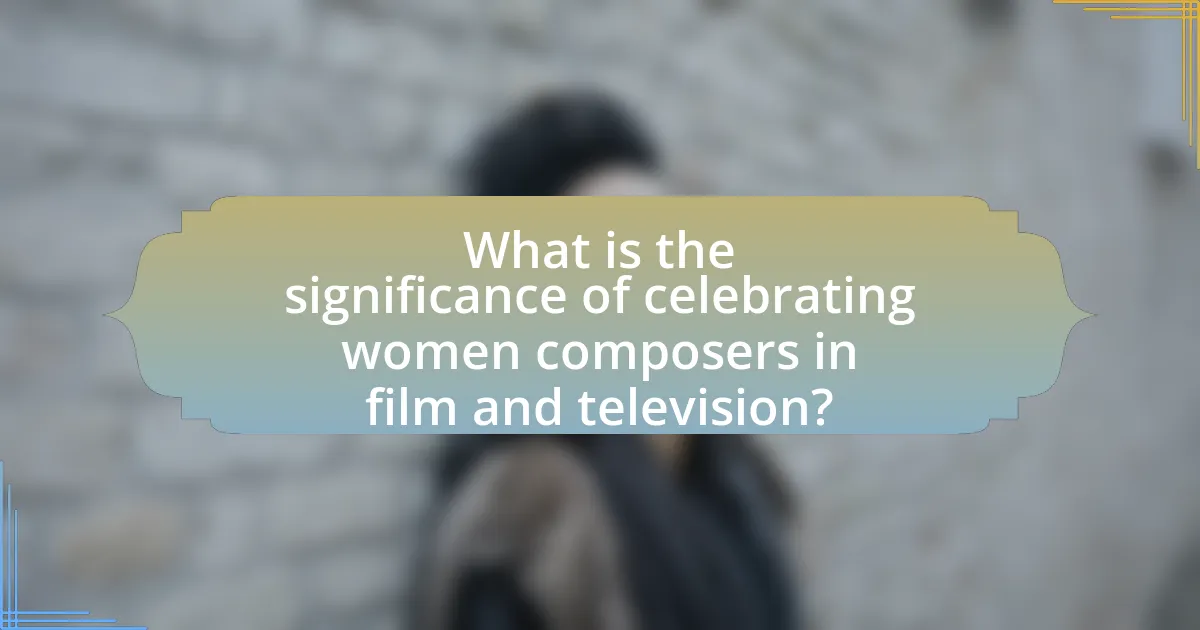
What is the significance of celebrating women composers in film and television?
Celebrating women composers in film and television is significant because it promotes gender equality and representation in a historically male-dominated industry. Recognizing the contributions of women composers not only highlights their artistic achievements but also inspires future generations of female musicians and composers. For instance, only 2% of film scores in 2019 were composed by women, according to a study by the Annenberg Inclusion Initiative, underscoring the need for increased visibility and support for female talent in this field. By celebrating their work, the industry can foster a more inclusive environment that values diverse perspectives and creativity.
How have women composers contributed to the film and television industry?
Women composers have significantly shaped the film and television industry by bringing diverse perspectives and innovative musical styles to the forefront. Notable figures such as Hildur Guðnadóttir, who won an Academy Award for her score in “Joker,” and Rachel Portman, the first female composer to win an Oscar for “Emma,” exemplify the impact of women in this field. Their contributions have not only enriched storytelling but have also paved the way for future generations of female composers, as evidenced by the increasing recognition and opportunities for women in scoring films and television shows.
What are some notable achievements of women composers in this field?
Women composers have made significant achievements in film and television, notably breaking barriers and gaining recognition in a historically male-dominated industry. For instance, Hildur Guðnadóttir won an Academy Award for Best Original Score for her work on “Joker” in 2020, marking her as the first woman to win this award in over 20 years. Additionally, Rachel Portman became the first female composer to win an Academy Award for Best Original Score for “Emma” in 1997. Furthermore, composers like Laura Karpman and Pinar Toprak have been recognized for their contributions to major franchises, with Toprak being the first woman to score a Marvel film, “Captain Marvel,” in 2019. These achievements highlight the growing influence and recognition of women in the field of film and television composition.
How have their contributions shaped the soundtracks of iconic films and shows?
Women composers have significantly shaped the soundtracks of iconic films and shows through their innovative musical styles and emotional depth. For instance, composers like Rachel Portman, who won an Academy Award for “Emma,” and Hildur Guðnadóttir, who received an Oscar for “Joker,” have brought unique perspectives that enhance storytelling and character development. Their contributions often incorporate diverse musical elements, which resonate with audiences and elevate the overall cinematic experience. Additionally, women composers have increasingly gained recognition, leading to a broader acceptance of varied musical narratives in mainstream media, as evidenced by the growing number of awards and nominations they receive in recent years.
Why is it important to recognize women in this profession?
Recognizing women in the profession of film and television composition is crucial for promoting gender equality and diversity in a historically male-dominated field. Acknowledgment of women’s contributions not only validates their work but also inspires future generations of female composers, fostering a more inclusive industry. According to a study by the Annenberg Inclusion Initiative, women composed only 2% of the top 100 films in 2019, highlighting the need for recognition and support to address this disparity. By celebrating women composers, the industry can challenge stereotypes, encourage diverse storytelling, and enhance the richness of cinematic music.
What impact does recognition have on future generations of female composers?
Recognition significantly enhances the opportunities and visibility for future generations of female composers. When female composers receive acknowledgment for their work, it creates role models and benchmarks for aspiring artists, demonstrating that success is attainable in a historically male-dominated field. For instance, the success of composers like Hildur Guðnadóttir, who won an Academy Award for her score in “Joker,” not only validates the contributions of women in film music but also inspires young female musicians to pursue similar paths. This recognition can lead to increased funding, mentorship opportunities, and a broader acceptance of female composers in the industry, ultimately fostering a more inclusive environment that encourages diverse voices in music composition.
How does celebrating diversity in music enhance storytelling in film and television?
Celebrating diversity in music enhances storytelling in film and television by providing a richer emotional landscape and a broader range of cultural perspectives. Diverse musical elements can evoke specific feelings and connect audiences to characters and narratives in a more profound way. For instance, the incorporation of various musical styles, such as traditional Indigenous music or contemporary hip-hop, can reflect the cultural backgrounds of characters, making their stories more relatable and authentic. Research shows that films with diverse soundtracks often achieve higher audience engagement and critical acclaim, as seen in productions like “Black Panther,” which utilized a blend of African musical traditions and modern sounds to deepen its narrative impact. This approach not only enriches the storytelling but also promotes inclusivity and representation in the arts.
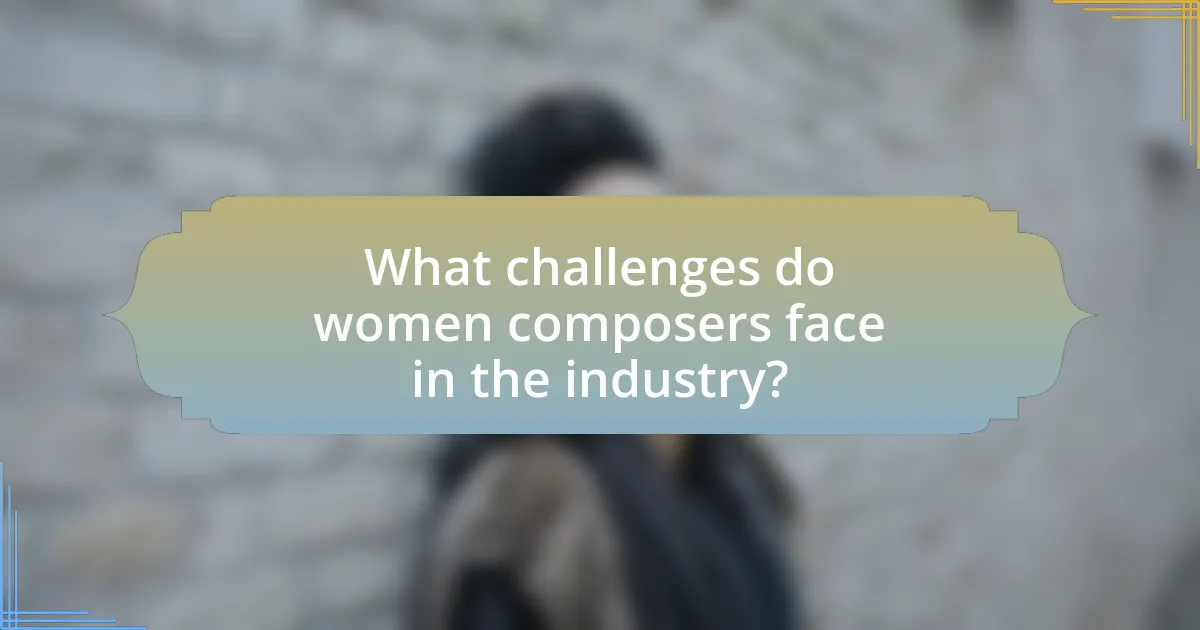
What challenges do women composers face in the industry?
Women composers face significant challenges in the industry, including gender bias, limited access to networking opportunities, and underrepresentation in key decision-making roles. Research indicates that women make up only about 2% of film composers, highlighting the systemic barriers they encounter. Additionally, studies show that female composers often receive less funding and fewer projects compared to their male counterparts, which further exacerbates their visibility and career advancement. These challenges are compounded by a lack of mentorship and support systems tailored to women in the field, making it difficult for them to establish themselves in a predominantly male-dominated industry.
How do gender biases affect opportunities for women composers?
Gender biases significantly limit opportunities for women composers by perpetuating stereotypes that undervalue their contributions and restrict their access to professional networks. Research indicates that women are often underrepresented in film and television scoring roles, with a study by the Alliance for Women Film Composers revealing that only 2% of the top-grossing films from 2018 to 2020 featured female composers. This disparity is compounded by a lack of mentorship and visibility, as male-dominated industry practices often favor male composers for high-profile projects. Consequently, these biases create an environment where women face systemic barriers, hindering their career advancement and recognition in the field.
What are some common stereotypes that women composers encounter?
Women composers commonly encounter stereotypes that question their technical abilities and assert that they are less capable than their male counterparts. These stereotypes often include assumptions that women are more suited for writing emotional or lyrical music rather than complex or innovative compositions. Additionally, there is a prevalent belief that women prioritize family over their careers, which can lead to doubts about their commitment to the profession. Research indicates that these biases can hinder opportunities for women in the industry, as evidenced by the underrepresentation of women in film scoring roles, where only about 2% of composers for major films are women.
How do these biases influence the hiring process in film and television?
Biases significantly influence the hiring process in film and television by perpetuating gender and racial disparities. For instance, studies show that women composers are often overlooked for projects despite their qualifications, with only 2% of film scores being composed by women in 2019, according to the USC Annenberg Inclusion Initiative. This bias leads to a lack of representation and diversity in the industry, as decision-makers frequently favor male composers based on historical norms and stereotypes. Consequently, these biases not only affect individual careers but also shape the overall narrative and creative landscape of film and television.
What barriers exist for women composers in gaining visibility?
Women composers face significant barriers in gaining visibility, primarily due to systemic gender biases and a lack of representation in the industry. Research indicates that women are underrepresented in film and television scoring roles, with only about 2% of the top-grossing films featuring female composers. This disparity is compounded by limited networking opportunities and mentorship programs tailored for women, which restrict their access to influential industry contacts. Additionally, societal stereotypes often lead to the perception that women are less capable in technical roles, further diminishing their chances of being hired for prominent projects. These factors collectively hinder the recognition and advancement of women composers in the competitive landscape of film and television.
How does the lack of representation in awards and nominations impact women composers?
The lack of representation in awards and nominations significantly impacts women composers by limiting their visibility and recognition in the industry. This underrepresentation can lead to fewer opportunities for women to secure funding, projects, and collaborations, as awards often serve as validation of talent and credibility. For instance, a study by the Annenberg Inclusion Initiative found that only 2% of the top-grossing films from 2007 to 2019 featured female composers, highlighting the systemic barriers they face. Consequently, the absence of women in prestigious award categories perpetuates a cycle of invisibility, discouraging aspiring female composers and reinforcing gender stereotypes within the field.
What initiatives are in place to support women composers in overcoming these barriers?
Initiatives supporting women composers in overcoming barriers include mentorship programs, funding opportunities, and advocacy organizations. For instance, the Alliance for Women Film Composers provides networking, resources, and visibility for women in the industry, while organizations like the Sundance Institute offer grants and fellowships specifically for female composers. Additionally, initiatives such as the Women in Film’s Film Financing Program aim to address financial disparities by providing funding and support tailored to women creators. These efforts collectively work to dismantle systemic obstacles and promote gender equity in the field of film and television composition.

How can we promote and support women composers in film and television?
To promote and support women composers in film and television, industry stakeholders must actively create opportunities for women through mentorship programs, funding initiatives, and inclusive hiring practices. Research indicates that women are significantly underrepresented in film scoring, with only 2% of the top-grossing films featuring female composers from 2018 to 2020, according to a study by the Annenberg Inclusion Initiative. By establishing mentorship programs that connect emerging female composers with established professionals, the industry can foster talent and provide guidance. Additionally, funding initiatives specifically aimed at projects led by women can help overcome financial barriers. Implementing inclusive hiring practices that prioritize gender diversity in scoring teams will further ensure that women composers receive equitable opportunities in film and television.
What initiatives are currently in place to celebrate women composers?
Current initiatives to celebrate women composers include the establishment of awards specifically recognizing their contributions, such as the Alliance for Women Film Composers’ Awards, which honors outstanding achievements in film scoring by women. Additionally, organizations like the Women’s Audio Mission provide mentorship and training programs aimed at increasing the visibility and opportunities for women in music composition. Events such as the “Women Composers Festival of Music” showcase the works of female composers, promoting their music through performances and discussions. These initiatives collectively aim to elevate the presence and recognition of women composers in the film and television industry.
How do festivals and awards specifically aimed at women composers contribute to their recognition?
Festivals and awards specifically aimed at women composers significantly enhance their recognition by providing dedicated platforms that spotlight their work and achievements. These events often feature performances, screenings, and discussions that highlight the contributions of women in the field, thereby increasing visibility and appreciation for their compositions. For instance, the Alliance for Women Film Composers hosts events that celebrate female talent, fostering a community that encourages networking and collaboration. Additionally, awards such as the International Film Music Critics Association Awards include categories specifically for women, which not only honors their contributions but also raises awareness about gender disparities in the industry. This recognition can lead to increased opportunities for women composers, including commissions, collaborations, and greater representation in mainstream media.
What role do educational programs play in fostering new talent among women composers?
Educational programs play a crucial role in fostering new talent among women composers by providing essential training, mentorship, and networking opportunities. These programs often include workshops, masterclasses, and collaborative projects that specifically target women, helping to bridge the gender gap in a historically male-dominated field. For instance, initiatives like the ASCAP Foundation’s “Songwriters: The Next Generation” program have been instrumental in supporting emerging female composers by offering resources and platforms to showcase their work. Such educational frameworks not only enhance skills but also build confidence and visibility, ultimately contributing to a more diverse and inclusive landscape in film and television music composition.
What can audiences do to support women composers?
Audiences can support women composers by actively seeking out and promoting their work. This includes attending performances, streaming their music, and sharing their compositions on social media platforms. Research indicates that increased visibility leads to greater opportunities; for instance, a study by the University of Southern California found that women composers are significantly underrepresented in film and television scoring, with only 2% of the top-grossing films featuring female composers. By advocating for and prioritizing the music of women composers, audiences can help to create a more equitable landscape in the industry.
How can listeners actively seek out and promote works by women composers?
Listeners can actively seek out and promote works by women composers by exploring curated playlists, attending concerts featuring their music, and supporting organizations that highlight their contributions. For instance, platforms like Spotify and Apple Music often have playlists dedicated to women composers, making it easier for listeners to discover their works. Additionally, attending live performances or festivals that showcase female composers can enhance visibility and appreciation for their music. Supporting organizations such as the Alliance for Women Film Composers, which advocates for women in the industry, further promotes their work and raises awareness about their contributions to film and television.
What are some platforms or resources to discover music by women composers?
Platforms and resources to discover music by women composers include the website “Women Composers Festival of Hartford,” which showcases works by female composers through performances and events. Additionally, “The International Alliance for Women in Music” provides a directory of women composers and their works, promoting visibility and access to their music. Streaming services like Spotify and Apple Music often feature curated playlists highlighting women composers, such as “Women Composers” playlists that include a variety of genres. Furthermore, organizations like “Sisters of the Sun” focus on promoting the works of women composers in contemporary music. These platforms collectively enhance the accessibility and recognition of music created by women composers.
What are best practices for advocating for women composers in the industry?
Best practices for advocating for women composers in the industry include promoting their work through dedicated platforms, ensuring equitable representation in hiring practices, and creating mentorship programs. Promoting women composers can be achieved by featuring their compositions in film festivals and industry events, which increases visibility and recognition. Ensuring equitable representation involves actively seeking to include women in scoring projects, as studies show that diverse teams produce more innovative outcomes. Creating mentorship programs connects emerging women composers with established professionals, fostering growth and opportunities in a historically male-dominated field. These practices are supported by initiatives like the Alliance for Women Film Composers, which aims to elevate the presence of women in the industry.
